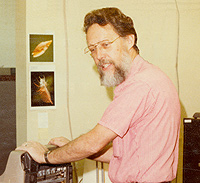Berkeleyan
Obituary
Don Rogers
![]()
04 June 2008
Don Rogers, who provided significant research support in Cory Hall from 1967-85, died May 19 from complications of ALS (amyotrophic lateral sclerosis).
 Don Rogers |
Don was born and raised in Utah, the son of a construction worker. In his youth his family moved frequently, and Don was raised in mostly rural settings. In 1946, at the age of 16, he moved with his disabled mother to Berkeley, later graduating from Berkeley High School. Don was the sole support of his household.
In the mid-1950s, after a series of odd jobs, Don began work at the campus Radiation Laboratory (now Lawrence Berkeley National Laboratory), on the site of what is now Latimer Hall. He learned the art of scientific glassblowing from the Rad Lab’s legendary master glassblower, Harry Powell, eventually working for no fewer than eight Nobel Prize winners on their experimental apparatus.
In 1967, Don began work as a glassblower in Cory Hall’s Microwave Tube Laboratory, quickly mastering the art of making electron tubes and lasers for use by quantum-electronics graduate students (including Charles Shank, who eventually became director of Lawrence Berkeley National Lab).
Don later moved on to the EECS semiconductor lab, where he sited the ion implanter, designed and maintained process equipment, and eventually oversaw the building and startup of the microfabrication lab.
Don enjoyed telling stories about his career and was known for his open mind and social conscience. At his request I visited him at his home in San Luis Obispo in April; he wanted to explain the gravity of his illness and say farewell. He was alert, objective, full of stories, and amazingly pleasant given his health. Don had thoroughly researched ALS and made the very conscious decision to end his life on his own terms by refusing food and medications, in his home and among his friends.
I would describe Don as a deeply spiritual person (though without religion) who appreciated a complex, nebulous universe that defies description by mankind. He will be missed by all of us who crossed his path.
— Robert Hamilton, EECS

